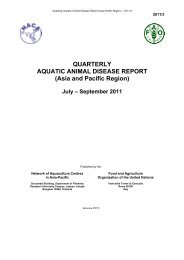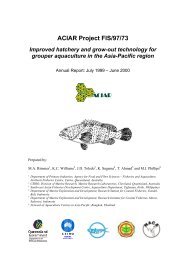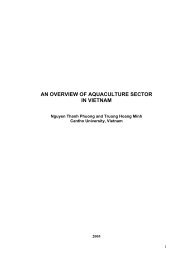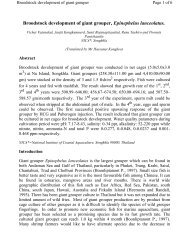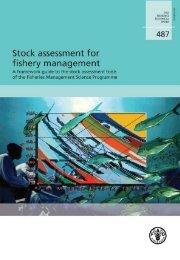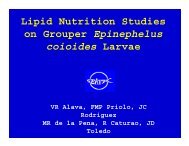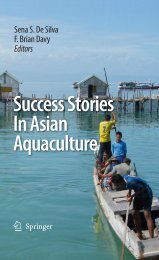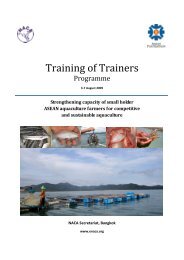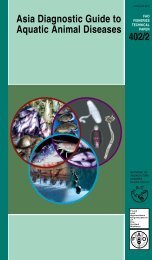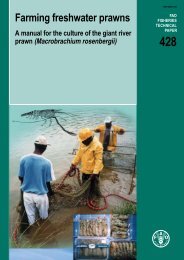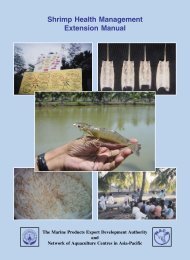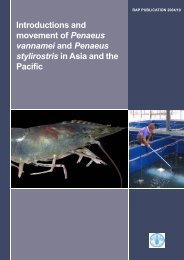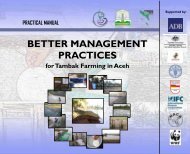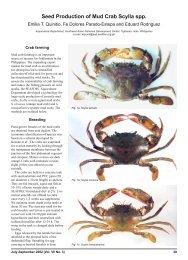Shrimp Farming and the Environment - Library
Shrimp Farming and the Environment - Library
Shrimp Farming and the Environment - Library
You also want an ePaper? Increase the reach of your titles
YUMPU automatically turns print PDFs into web optimized ePapers that Google loves.
equired to promote sustainability are wide ranging <strong>and</strong> complex, <strong>and</strong> require much collaboration <strong>and</strong>integration. How can this be done, <strong>and</strong> what might be <strong>the</strong> roles of <strong>the</strong> various stakeholders?Central governments have been ra<strong>the</strong>r ineffective to date in implementing <strong>and</strong> enforcing constraints onshrimp farmers or promoting better practices, <strong>and</strong> <strong>the</strong>y are increasingly unwilling to provide funds.However, <strong>the</strong>re is a wide range of necessary functions for central government, including <strong>the</strong>se:• Create <strong>the</strong> necessary legislative framework;• Promote <strong>and</strong> facilitate planning initiatives at provincial <strong>and</strong> district levels;• Monitor <strong>the</strong> success or failure/problems of various local initiatives;• Encourage coordination <strong>and</strong> collaboration between industry, agencies, NGOs, farmers, localgovernment, scientists, extension workers, <strong>and</strong> o<strong>the</strong>rs;• Support research, training, <strong>and</strong> extension activities;• In collaboration with district <strong>and</strong> local government examine <strong>the</strong> opportunities for usinggovernment sponsored economic incentives <strong>and</strong> constraints; <strong>and</strong>• Working with all of <strong>the</strong> industry <strong>and</strong> o<strong>the</strong>r stakeholders in <strong>the</strong> vicinity, facilitate formulationof “codes of conduct for sustainable shrimp farming” <strong>and</strong> certification programs.Provincial or district government can play a crucial role in promoting sustainable development, sinceit is well placed to integrate <strong>the</strong> work of different sectors <strong>and</strong> to address <strong>the</strong> needs of <strong>the</strong> variousstakeholders with respect to practical issues. Specifically, district/provincial government can:• Undertake sector (i.e., coastal aquaculture) environmental assessment to provide an objective,technical basis for <strong>the</strong> development of plans;• Actively develop sector, natural resource, <strong>and</strong> integrated coastal management plans (including<strong>the</strong> minimum content suggested above);• Pressure <strong>the</strong> central government to develop or adapt legislation to meet <strong>the</strong> needs identified in<strong>the</strong> assessment <strong>and</strong> planning process;• Facilitate, promote, <strong>and</strong> require <strong>the</strong> development of farmer representative organizations;• Facilitate links among local producers, <strong>and</strong> among producer organizations <strong>and</strong> importing,processing, or retailing outlets, in order to develop environmental labeling initiatives; <strong>and</strong>• Create an adequately strong capacity to enforce national <strong>and</strong> local regulations.<strong>Shrimp</strong> producers must begin to take responsibility for <strong>the</strong>ir actions <strong>and</strong> effects, not least in order tomaintain an acceptable market image. Producers can:• Organize <strong>the</strong>mselves at various levels so that <strong>the</strong>y have greater input in, <strong>and</strong> take greaterresponsibility for, environmental <strong>and</strong> social initiatives;• Develop guidelines <strong>and</strong> codes of practice for <strong>the</strong>ir own conduct (see GAA 1998);• Collaborate with consumer <strong>and</strong> environmental groups <strong>and</strong> government to develop operatingst<strong>and</strong>ards <strong>and</strong> codes of practice that may form <strong>the</strong> basis for developing environmental labelinginitiatives, perhaps on an industrywide or pilot project basis; <strong>and</strong>• Ti<strong>the</strong> some proportion of profits to support local community services.International aid donors <strong>and</strong> development banks are well placed to apply pressure to promotesustainability at a range of levels, from central government to individual projects. They can:• Support a range of initiatives to establish <strong>the</strong> necessary preconditions for more sustainableshrimp culture discussed in this report <strong>and</strong> elsewhere—in particular, initiatives related tosector environmental assessment, sector planning, <strong>and</strong> integrated coastal managementincorporating such plans;• Support pilot projects that aim to promote sustainable shrimp culture development;• Require aspiring shrimp farmers who seek development aid to meet a set of conditions thatcould be developed from <strong>the</strong> guidelines <strong>and</strong> recommendations presented in this <strong>and</strong> o<strong>the</strong>rreports, particularly those relating to <strong>the</strong> assessment <strong>and</strong> planning of coastal aquaculturedevelopment;• Support <strong>the</strong> establishment of environmental labeling programs; <strong>and</strong>• Promote <strong>and</strong> facilitate continuing debate <strong>and</strong> discussion on <strong>the</strong>se issues.63



